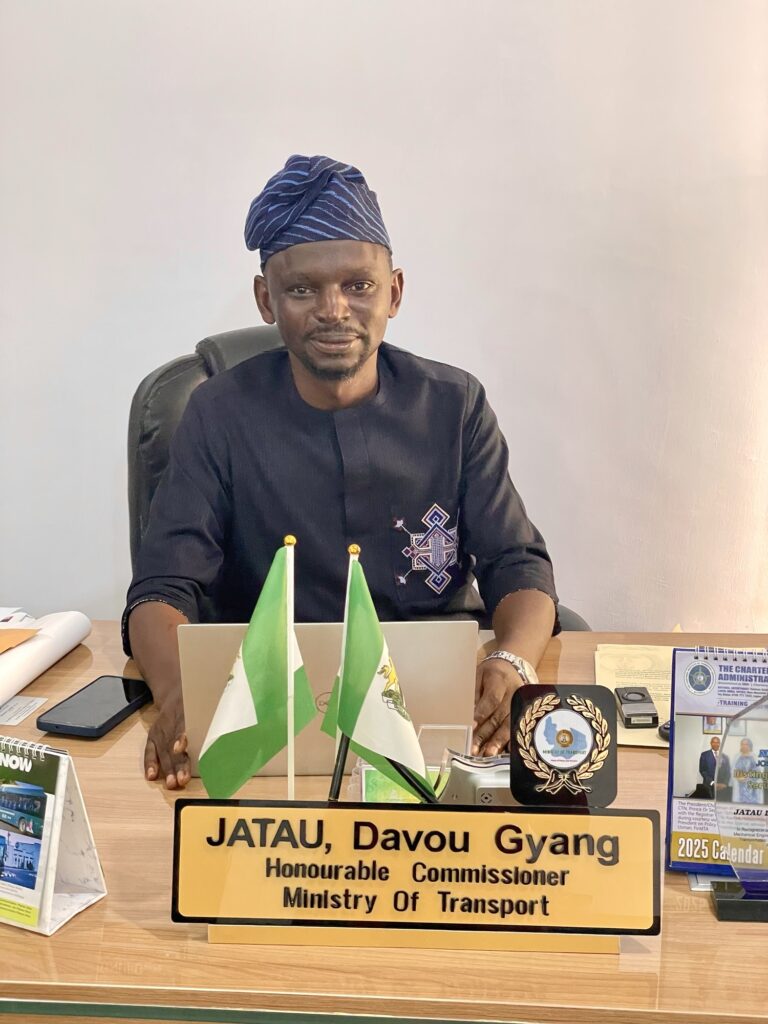After more than a decade of dormant railway infrastructure, Plateau State is witnessing a remarkable transformation in its transportation landscape. The state’s railway revival project, spearheaded by Governor Caleb Manasseh Mutfwang’s administration, represents more than just infrastructure development it’s a strategic response to economic challenges and a catalyst for business growth.
In this exclusive interview, Hon. Jatau Davou Gyang, Commissioner for Transport, shares the inspiring journey of bringing trains back to Plateau State, the obstacles overcome, and the promising future ahead.
The railway project emerged from necessity when President Bola Tinubu announced the removal of fuel subsidies on May 29, 2023. “His Excellency was exploring various transportation options that could ease the burden and help mitigate the hike in transport fares across the state,” Commissioner Gyang explains. The governor’s vision was clear: provide alternative transportation modes to cushion the economic impact on citizens.
For over a decade, Plateau State’s railway infrastructure lay abandoned. The last rolling stocks that departed from the state were stranded in Maiduguri, Borno State, victims of vandalism and destruction along the rail routes. What seemed like a lost cause became the foundation for an ambitious revival plan.
The rehabilitation project required a strategic partnership between Plateau State Government and the Nigerian Railway Corporation (NRC). The arrangement was straightforward yet significant: the state would fund the rehabilitation of both rail tracks and rolling stock, while NRC would provide the locomotives and coaches.
“That deal was sealed in 2023 barely a month or two into the lifespan of this administration,” Commissioner Gyang notes, highlighting the urgency with which the new government approached the project.
The project’s first major hurdle came unexpectedly. When NRC staff went to Maiduguri to retrieve rolling stock as agreed, they encountered what Commissioner Gyang describes as “blackmail” against both Plateau State and the NRC itself. Despite valid documentation, a conspiracy prevented the evacuation of the rolling stock from Maiduguri to Jos.
“That was when Plateau was in the media for the wrong reasons,” the Commissioner recalls. However, this setback didn’t derail the project. NRC sourced alternative rolling stock, which arrived in Jos by the end of 2023.
May 29, 2024, marked a historic day for Plateau State exactly one year after the administration began. The first trial run took place between Bukuru and Jos Metropolis, signaling the return of railway services after years of absence.
The rehabilitation covered 18 kilometers in the first phase, stretching from the rail terminal in Jos to Wereng (Kuru Station). This achievement came with its own challenges, including hazardous electricity cables crossing the tracks and typical operational issues like derailment and detachment during the trial period.
“It’s common in train operations globally to have issues of derailment,” Commissioner Gyang explains, emphasizing that these challenges were part of the normal testing process.
After six months of successful trial operations ending in December 2024, the project reached a crucial transition phase. The agreement required NRC to take over operations, as the state government lacks specialized railway management expertise.
A change in NRC leadership created temporary delays, but Commissioner Gyang announced a breakthrough: “On the 7th of April, we finally sealed the deal signed an agreement with the Nigerian Railway Corporation for them to come and take over the running of rail services in Jos.”
The commissioning is scheduled for July 17, 2025, with the Federal Minister of Transportation expected to witness the handover ceremony.
The railway revival promises significant economic benefits for Plateau State. Commissioner Gyang paints a compelling picture of the business opportunities:
Construction Industry Revolution : With railway access to cement factories in places like Gombi and Badruga, construction costs could drop dramatically. “Cement that’s sold for ₦10,000 we could be buying it for ₦5,000,” he explains, noting that over 50% of current cement prices represent transportation costs.
Agricultural Transformation : The railway will enable large-scale agricultural production by connecting farmers to distant markets. “When there are known markets where you’re sure these products can get to Lagos and your payment is assured you produce more,” the Commissioner notes.
Intermodel transportation : The railway connects to the airport axis and Inland Container Depot, creating a comprehensive transportation network. This intermodal system will boost trade and commerce across the state.
By establishing truck terminals connected to railway extensions, the system will reduce urban traffic congestion while maintaining efficient goods movement.
Plateau State’s railway revival aligns with President Tinubu’s national railway development agenda. Chinese contractors are currently working on rail tracks from Port Harcourt that will link to Jos and extend to Maiduguri. This positions Jos as a crucial node in Nigeria’s emerging railway network.
“With what we’ve done, this has attracted so much attention to the state that, in the recent railway map, Jos has been captured as a viable point for railway activities,” the Commissioner proudly states.
For businesses considering Plateau State as an investment destination, the railway project sends a clear message: the state is serious about infrastructure development and creating an enabling environment for commerce.
The project demonstrates the government’s commitment to innovative solutions and strategic partnerships. From agricultural producers to construction companies, from importers to exporters, the railway system opens new possibilities for business growth and expansion.
The Plateau State railway revival represents more than restored transportation infrastructure. It symbolizes resilience, innovation, and forward thinking leadership. Despite facing significant challenges from blackmail attempts to technical setbacks the project has moved from concept to reality.
As the Commissioner Gyang concludes our interview, his optimism is palpable. The railway project has not only restored a vital transportation mode but has also restored hope for economic prosperity and business growth in Plateau State.
With the commissioning ceremony approaching and full operations set to begin under NRC management, Plateau State stands on the brink of a transportation revolution that promises to transform its economic landscape for generations to come.

